Are you comfortable living with rats in your home?
I know I wasn’t when my house had a visit from one of these disgusting rodents!
Are rats dangerous? Here are 8 reasons why they are and you should do what you can to get rid of them immediately!
Before we get started, let’s have a quick reminder about some of the signs that you have rats in your attic or home:
- Bite marks on your household items
- Gnawing
- Small rat droppings in corners or drawers or furniture. They are usually small and 12mm long. Rat droppings can host a disease such as hantavirus.
- Dirty furs that are black
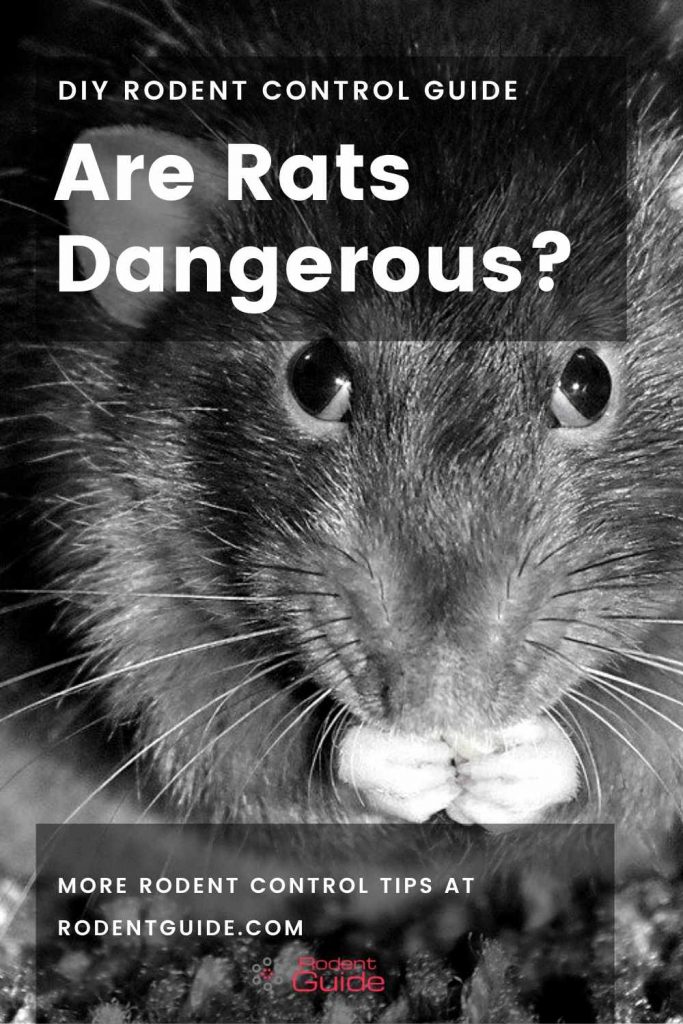
Are Rats Dangerous? 8 Clear Reasons Why They Are!
Here are the 8 main reasons. First, you may already know some reasons, such as the potential to spread hantavirus, which is contracted through rat droppings. But do you know all of them?
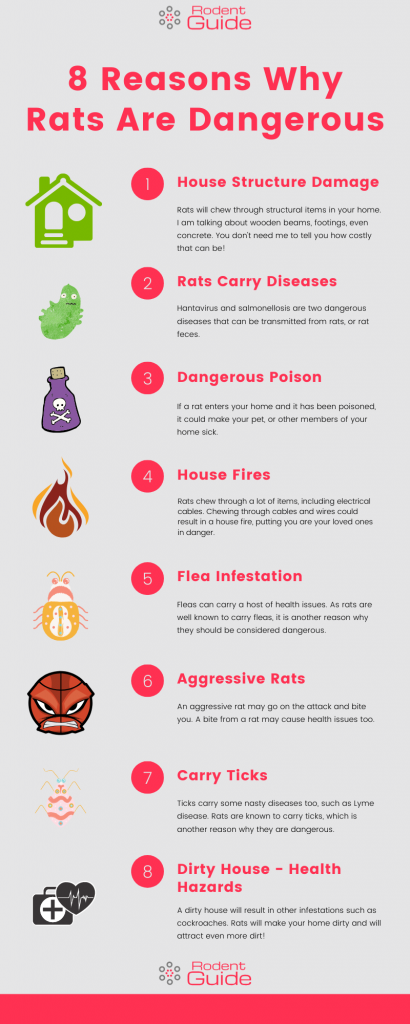
1. Damage to your home
Rats are well known for being able to chew through just about anything! That means they can damage a lot of things in your home.
They have teeth that can bite through furniture, wires and cables, some parts of your home and even your clothes.
As rats can chew through quite a few items, there is a possibility that they will chew through structural items in your home. I am talking about wooden beams, footings, and even concrete. You don’t need me to tell you how costly that can be!
It may start as a small gnaw mark, but it will get bigger. The weather will make it worse too. Eventually, it will become weak enough to crumble apart.
How dangerous are rats? When you consider the structural and electrical damage they can do to your property, rats can be very hazardous!
2. They bring diseases
When considering why rats are dangerous, it is prudent to remember that rats can carry diseases with them, and some of them can be lethal to humans and other animals (your pets, for instance).
These diseases are lethal to humans, for example, salmonellosis and bubonic plague (spread by the fleas that rats carry).
Rats can transmit a disease to a human through rat droppings (feces), urine (through the water supply, too), and some bugs that a rat can carry.
The plague is so savage that it killed about 60 percent of the population in Europe during the 14th century. How hazardous are rats? Considering this info, I would say they are extremely hazardous!
3. Pre-poisoned rat spells danger
Imagine this: Your neighbor has identified a rat problem in your area. They want to eliminate the rats to clear up your neighborhood and make the streets just that little bit cleaner.
What does he do?
He sets up a few rat traps and fills them with poison. He certainly wants to end the reign of this rodent!
Next thing you know, that rat is getting close to your house, and your pet is chomping at the bit to grab hold of it. So if your pet takes a chunk out of the rat, they could be affected by the poison and may need emergency veterinary treatment or maybe die.
It is not just a danger to a human that we need to consider; this rodent will even harm your pet through secondary poisoning.
Not only that, but if a rat gets in your cavity walls and the poison takes effect, you have a dead rat odor taking over your home!
4. Can cause electrical issues/house fire
We have already discussed that rats love chewing on tons of items. I also mentioned that rats could chew on cables. That could be deadly.
See where this is going?
Potentially, a rat could chew through an electrical wiring which may start a fire in your home.
Fire can damage your property, potentially costing you more than just money.
You can see how a pest control issue suddenly turns deadly, right?
5. Infestation of fleas
Fleas are invasive and spread like wildfire!
Rats are well-known flea hosts. History credits rats as to why the plague killed so many folks.
How? Because the bubonic plague was spread via fleas that hitched a ride on the back of rats.
Rats were able to help the fleas travel fast, aiding the spread of this disease and killing many people.
Not only will fleas help to spread disease, but they can also be a costly pest to get rid of in your home. This is especially true if you have pets.
6. Cornered rats get aggressive
Rats can be dangerous, especially when they feel they have been threatened. A cornered rat can be a very angry rat!
They can and will bite and scratch you, thus transmitting diseases to your family.
Although the bite is not fatal, some diseases that rats transmit can be, especially for infants.
They also contaminate your food and run around the kitchen where you prepare it. Ingesting the contaminated food and preparing meals the rat has trodden on can be hazardous to your health.
7. Ticks and associated diseases
Rats carry fleas; we have discussed that and the bubonic plague above. So what else do rats carry that makes them threatening to humans?
The answer is that they can also carry ticks. Ticks are annoying little critters that hook into you by burying their head under your skin to live off your blood supply. But, as if that wasn’t bad enough, they also have the potential to carry diseases too!
Ticks can carry Lyme disease, which, if left, can cause some severe health complications. Check out this guide on tick prevention.
The tick can carry a disease; the rat has the tick, which is dangerous.
Removing a tick from a human is relatively simple. You can use a pair of fine-tipped tweezers. Then, grab the tick close to the skin and pull it up with steady, even pressure.
Be careful not to leave any tick behind, and treat the area with rubbing alcohol or water and soap.
8. A dirty house means other health hazards
Rats make your house dirty and a breeding ground for other pests like cockroaches.
Having a dirty house also encourages other critters, like bed bugs! Bed bugs are speedy and aggressive breeders and will quickly take over an environment.
When other bugs begin to infest your home, you need to step up and take back control before your health, and your loved ones are affected.
Always clean up rat droppings, urine, and other evidence of rat activity in your home. Do this to reduce the risk of disease.
Frequently Asked Questions

What happens if a rat bites you?
First things first, it will hurt, but only a bit. If a rat bit me, I would be more concerned about the potential diseases it may transmit rather than the pain of the bite.
If a rat has bitten you, you need to know several symptoms associated with a rat bite. In doubt? Check with a medical professional.
Can a rat hurt you?
Rats can bite, and a rat bite will hurt a little. The biggest concern is the diseases that a rat can transmit. Ensure that you know the symptoms of diseases that a rat can transmit.
Rat droppings and urine usually transmit these.
Are rats aggressive?
Under usual circumstances, a rat will avoid human contact as much as possible. Rats and humans have been living closer together in recent times.
That means rats are becoming braver, especially those in big cities. So rats can become aggressive, especially if food is involved or you are cornering the rat.
Another huge reason a rat could be aggressive is if you get too close to a rat’s nest filled with baby rats. The mother is likely to see you as a threat which may invoke aggressive behavior in the rat.
Conclusion
Are rats dangerous? The 8 reasons in this post indicate that they are.
If you have rats near your home or in your yard, you must get rid of them ASAP.
Rats are a danger to you, your health, and your family’s health. Rats can spread disease through the bugs they carry, their droppings (hantavirus), and urine (especially if the urine enters your water supply).
One of the best ways to stop rats from getting into your home is to seal up any rat entry points that you may notice around the perimeter of your home.
Rats can use even holes as big as a quarter to gain entry.
Once these are sealed up, the rats cannot get into your home to cause damage. Therefore, prevention is better than cure.
If you do not like the idea of DIY pest control (it takes time and patients but will work), you should consider bringing in a professional pest control expert to get rid of these rodents.
Oh, and if you have had rats in your home, then make sure to clean up all the droppings and rat urine! The rodents may have left, but the disease risk remains a danger to humans. Plus, having rat droppings and urine around your home will eventually stink.
Good luck!

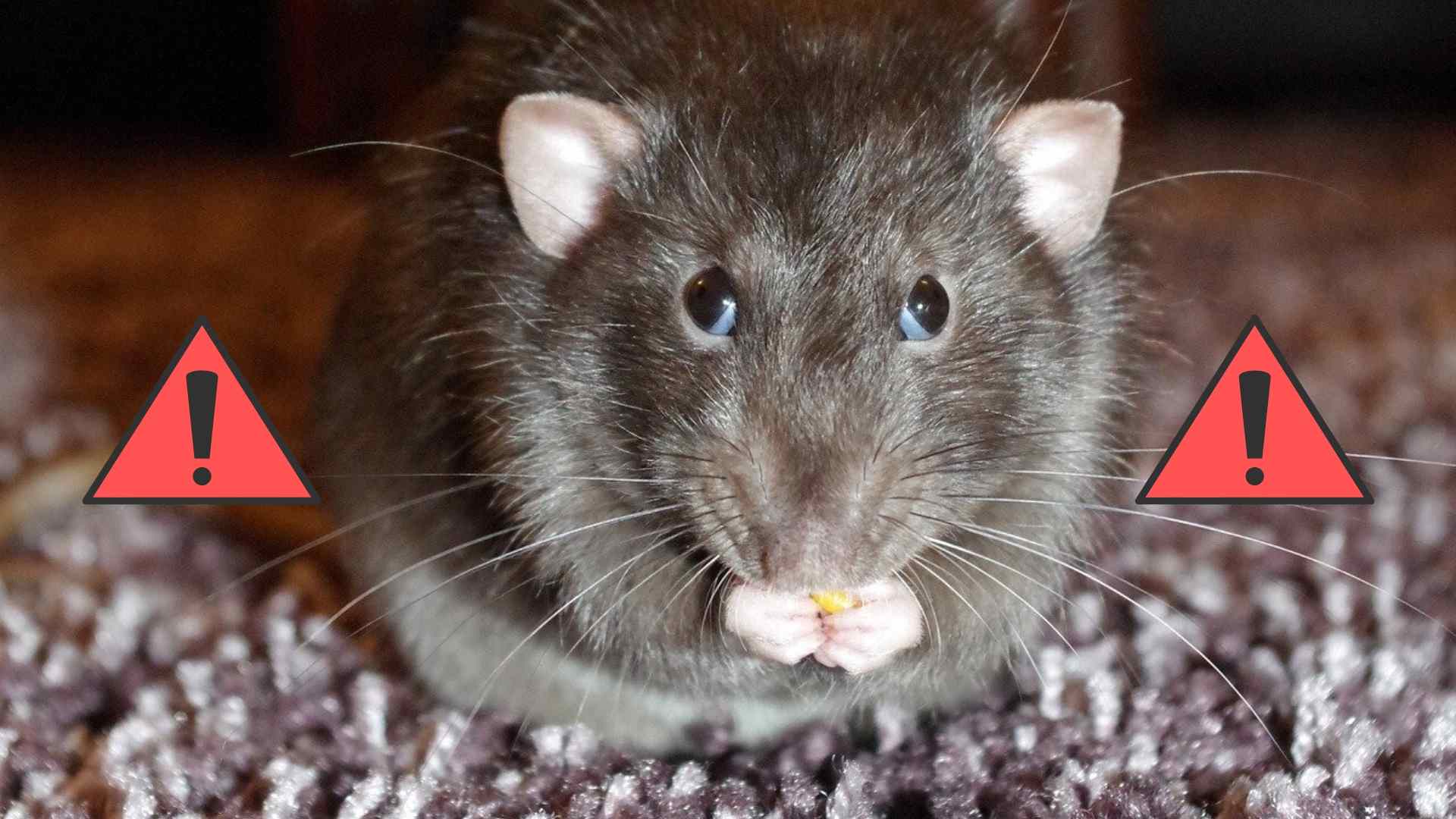
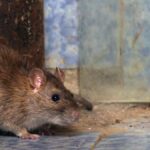
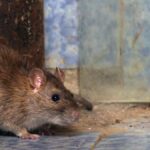





You made a great point about rats and how they can eventually chew on electric cables and cause a fire hazard. That thought alone is very terrifying for me since I live in a house with a family full of people reliant on electronic gadgets like TVs and computers. Since I remember seeing a rat scurry through my kitchen the other day, I’m not going to take any chances, so I’ll look for a rodent control expert immediately and have them drop by.